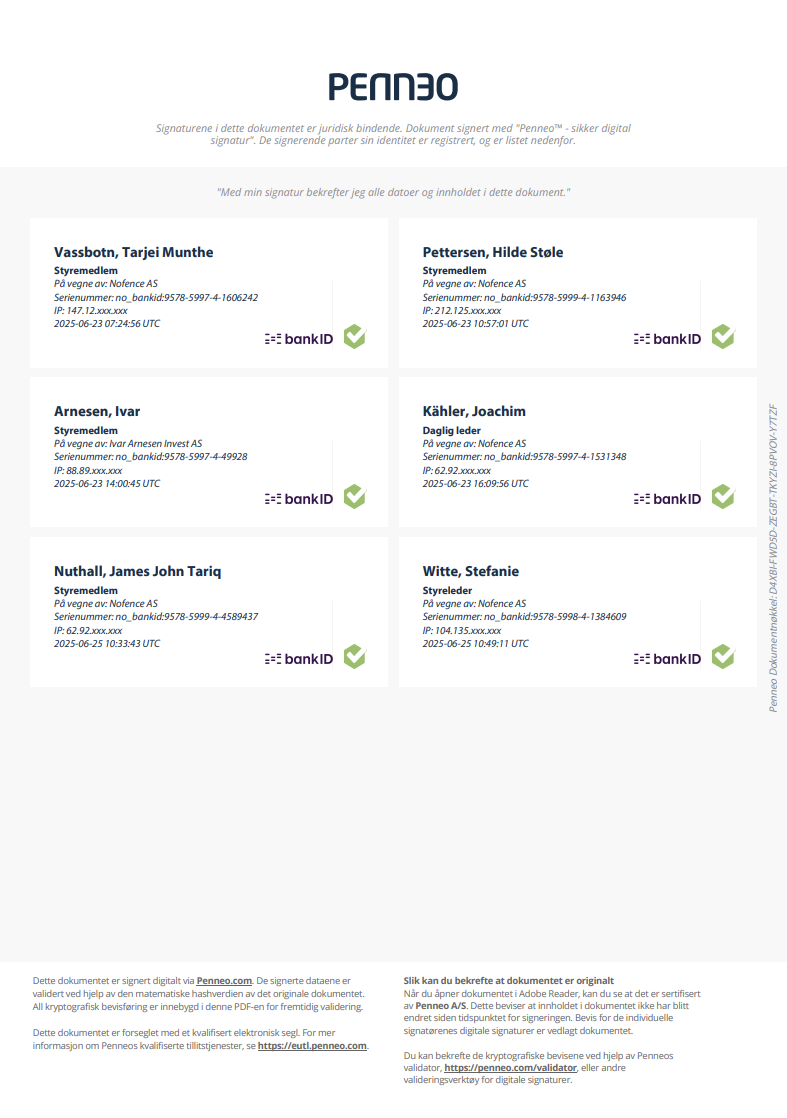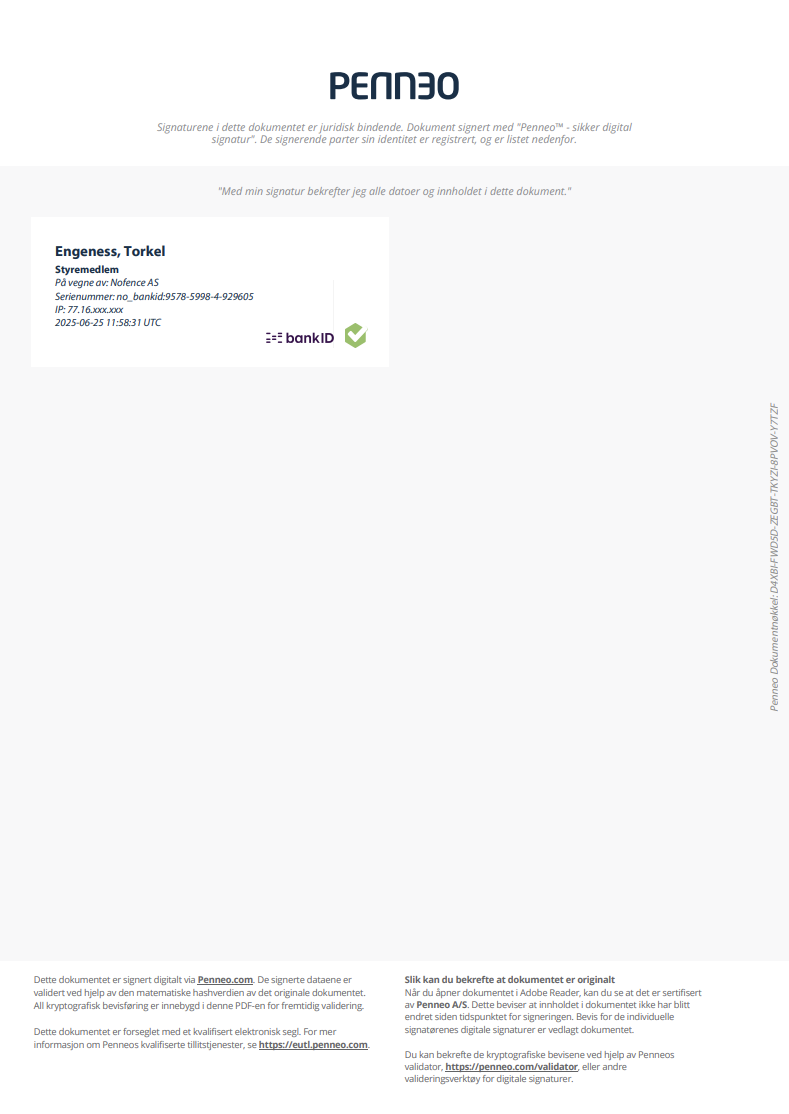Transparency Act Statement 2025
Table of Contents
Introduction
This is Nofence AS's first report under the Norwegian Transparency Act. The report
explains the work to identify, prevent and reduce actual and potential negative impacts on
fundamental human rights and decent working conditions in both its own operations and
the supply chain.
Inquiries regarding the report can be directed to finance@nofence.no.
About Nofence
Company structure and corporate governance
Nofence is headquartered in Molde and also has offices in Oslo and Trondheim. Nofence
has an international presence with offices in the UK, Spain and the USA. As of June 2025,
the group had a total of 91 employees (90.15 full-time equivalents), of which 73
employees (72.15 full-time equivalents) were based in Norway
Respect for human rights and decent working conditions
Nofence is committed to respecting internationally recognized human rights and to
promoting decent working conditions throughout the value chain. The company
recognizes that its responsibility extends beyond legal compliance and includes
preventing negative consequences related to its own operations, supply chain and
business relationships. Anchoring human rights in the business strategy is considered
important for building trust and creating long-term sustainability for both the company and
its stakeholders.
Anchoring in management systems and policies
Nofence has established its own human rights policy that clearly expresses the company's commitment to respecting fundamental human rights throughout its operations and value chain. In addition, considerations of human rights are integrated into other key management documents, such as the ethical guidelines for business partners and suppliers. Norwegian Transparency Act Statement Period: 2025 3 Penneo Dokumentnøkkel: D4XBI-FWD5D-ZEGBT-TKYZI-8PVOV-Y7TZF Together, these documents contribute to a comprehensive and structured approach to responsible business practices. All guidelines are reviewed and updated regularly to ensure that they are in line with changing risk conditions, applicable regulations and stakeholder expectations.
Policy Overview
Human Rights Policy
The Human Rights Policy expresses the company's commitment to respecting human rights throughout the business and value chain. The policy clarifies responsibilities related to due diligence assessments, supplier follow-up and complaint mechanisms, as well as expectations for business partners and suppliers.
Internal ethical guidelines
The internal ethical guidelines set standards for all employees in the company, and promote a work culture characterized by dignity, non-discrimination, safety and transparency. Employees are encouraged to report concerns, including ethical or human rights issues, and are protected from retaliation. The guidelines reinforce the company’s overall commitments to transparency, accountability and inclusion.
Code of Conduct for Business Partners and Suppliers
This document defines requirements for third parties acting on behalf of the company. The guidelines include provisions related to human rights, labor, anti-corruption, environmental responsibility and responsible business practices. Suppliers undertake to prohibit child labor, forced labor and discrimination, as well as to ensure safe working conditions throughout the business and value chain. Compliance with the guidelines is part of the contractual obligations.
Whistleblowing Policy
Nofence has established an internal whistleblowing policy that allows employees to report serious concerns in a safe and confidential manner. The policy applies specifically to internal employees and covers violations of laws, the company’s code of conduct and generally accepted ethical norms. Examples of matters that can be reported include risk to life or health, environmental damage, corruption, harassment and violations of privacy rules.
All internal reports are treated confidentially by the company's HR team, and the whistleblower is protected from retaliation in accordance with the Working Environment Act and relevant international regulations.
Although the whistleblower policy is aimed at internal employees, Nofence has also established a separate process for handling external inquiries. Matters reported by individuals or organizations outside the company, particularly related to possible violations of human rights or labor conditions in the supply chain, are handled by the finance department and can be sent to finance@nofence.no.
Responsibility
Responsibility for following up on the requirements of the Transparency Act is anchored in the People & Finance Department. The ESG controller has the operational responsibility for conducting due diligence assessments, following up on suppliers and reporting. The HR team is responsible for handling internal whistleblowing cases, while the finance department handles external inquiries and reports of concern related to potential violations of human rights or working conditions in the supply chain.
Risk mapping
This section explains Nofence's assessment of actual and potential risks related to fundamental human rights and decent working conditions in its own operations and supply chain. The findings are based on structured due diligence processes conducted in 2025, and reflect the company's commitment to avoid complicity in or association with human rights violations.
In 2025, Nofence adopted the digital platform Factlines to support systematic risk assessment and follow-up of business relationships, with a particular focus on suppliers.
Methodology and scope
Nofence carried out a due diligence of 194 active suppliers using the Factlines platform. Each supplier was assessed based on geographical location, industry affiliation and relevance to the core business. Special attention was paid to suppliers in high-risk areas or sectors, as well as those considered critical to Nofence’s operations.
A self-assessment form was sent to a prioritized group of suppliers with questions about compliance with the company's ethical guidelines. All suppliers were also asked to sign the ethical guidelines for business partners and suppliers, which set requirements for labor rights, non-discrimination, freedom of association and a ban on forced and child labor.
Findings and risk picture
Of the 194 suppliers Nofence collaborated with in 2025, 88 percent (171 suppliers) were located in Norway. The remaining suppliers were based in the USA, Spain, Sweden, the United Kingdom, and China.
No actual negative impacts related to human rights or labor conditions were identified in its own operations or among the company's most important suppliers during the reporting period. According to Factline's risk classification, the majority of suppliers, especially those based in Norway, are considered to have a low risk when it comes to corruption, compliance and labour standards.
Nofence recognises that there may be potential risks further up the value chain, particularly where visibility is limited. To address this, the company maintains close dialogue with key suppliers and conducts factory visits where suppliers are involved in production activities. Supplier agreements also include clear requirements for social and ethical conditions. Increased traceability and better insight into risks in early stages of the value chain remain important focus areas.
Measures implemented
Nofence has implemented several measures to integrate ethical risk assessments into its purchasing processes and supplier follow-up. To ensure ethical compliance, Nofence has introduced a structured screening process when onboarding new suppliers. The process involves an assessment of key risk factors such as geographical location, industry affiliation and the supplier's documented ability to comply with the ethical expectations set out in Nofence's contracts for business partners.
Factory audits are also carried out, especially in areas identified as high-risk based on regional governance indicators and sector-specific challenges. These visits provide an opportunity for direct dialogue and verification of working conditions, and contribute to a more informed risk management.
Furthermore, Nofence uses the digital platform Factlines for continuous monitoring of supplier performance. The system provides ongoing updates and risk classifications based on supplier overviews and external alerts, thus enabling a dynamic and responsive approach to due diligence assessments related to human rights.
Continuous improvement
Nofence wants to build on and strengthen its work with human rights and responsible business practices through continuous improvements. The measures and risk assessments that were carried out mark the first structured phase in the work to adapt the company's efforts to the requirements of the Transparency Act, through a more systematic and holistic approach to transparency and risk management.
Going forward, the company will further develop internal processes, strengthen relationships with suppliers and promote greater transparency. The main priority is to build robust and responsible supplier relationships that contribute to the protection of human rights and promote decent working conditions. At the same time, efforts are being made to improve traceability in parts of the supply chain where the risk is considered more complex and less visible. Where risks are identified, Nofence will take targeted, preventive action. This includes setting clear expectations in supplier agreements, following up with risk-based assessments, enabling effective grievance mechanisms, and strengthening ongoing monitoring.
Approval by the Board

